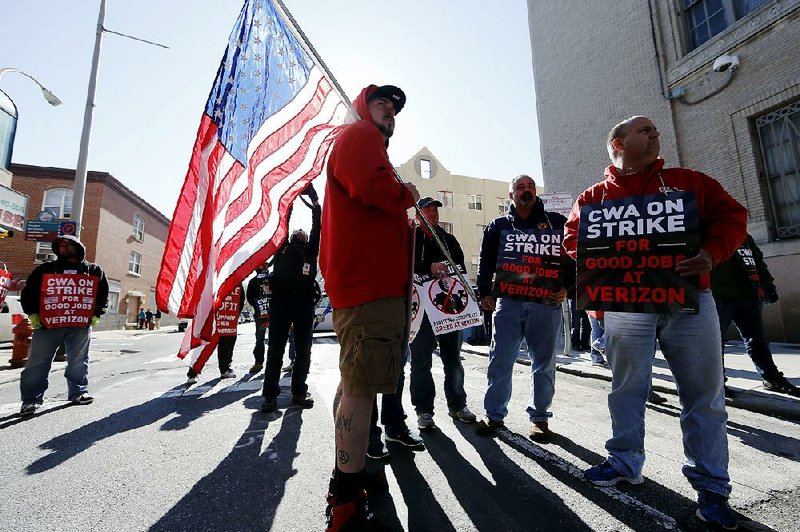About 39,000 landline workers from Verizon Communications Inc.'s largest labor unions walked off the job Wednesday after failing to reach agreement on a new contract with the phone giant by a 5 a.m. CDT deadline.
The strike, one of the largest in the U.S. in recent years, may delay billing and technical-support calls as well as disrupt installations for Internet and pay-TV subscribers from Massachusetts to Virginia.
Members of the Communications Workers of America and the International Brotherhood of Electrical Workers, which include cable splicers, customer-service representatives and fiber-optics technicians, are picketing hundreds of Verizon offices and equipment facilities in the Northeast and Mid-Atlantic, according to the Communications Workers of America's website. In preparation for the strike, Verizon has trained managers and contractors to step into the striking workers' roles, the company said in a statement Tuesday.
"Since last June, we've worked diligently to try and reach agreements that would be good for our employees, good for our customers and make the wireline business more successful now and in the future," Marc Reed, Verizon's chief administrative officer, said in a statement Tuesday.
Verizon had been negotiating with the two unions over terms of a contract to replace one that expired Aug. 1. The nation's largest wireless carrier wants union workers to contribute more to health benefits and be flexible on temporary job relocations. The unions want to limit those transfers of workers to other regions, protect jobs from being moved offshore and preserve pension increases.
The labor dispute is the first since Verizon took full control of Verizon Wireless and agreed to buy AOL Inc., two deals worth almost $135 billion that point toward a wireless-centric future. The company has been shedding union-heavy operations, including its fiber-optics business in three states earlier this month. Last year, landlines accounted for 29 percent of Verizon's revenue, down from almost 50 percent in 2008.
Of the workers, about 29,000 are represented by the Communications Workers of America, 10,000 by the International Brotherhood of Electrical Workers, according Candice Johnson, a spokesman for the communications workers union.
The last Verizon strike was in 2011, after a previous contract expired and talks broke down. The union members returned to work two weeks later. After 15 weeks of negotiations, the sides agreed to new deal.
Phone company strikes haven't been big events for investors. On Aug. 8, 2011, the first day of the last Verizon strike, Verizon shares fell 5.5 percent. When workers returned Aug. 20, the stock had fallen less than 1 percent from its prestrike level.
During a strike, companies will usually curtail spending on capital improvements and new projects, according to Andrew Hamerling, an independent telecommunications analyst.
"The irony is that these things usually help fiscal results, he said. "Buying any dislocation associated with a strike usually works out well. They have historically proven to be short-term blips at worst."
Verizon shares fell 66 cents, or 1.3 percent, to close Wednesday at $51.29.
Between 300 and 400 union members walked a picket line outside the company's office in downtown Albany, N.Y., where workers set up an inflatable "greedy pig" and rat.
In Philadelphia, about 100 striking workers took to the streets near the company's regional headquarters and chanted, "Scabs, go home!" at nonunion replacement workers.
The unions say Verizon wants to freeze pensions, make layoffs easier and rely more on contract workers. The company has said health care issues need to be addressed for retirees and current workers because medical costs have grown and that it wants "greater flexibility" to manage its workers.
Verizon also is pushing to eliminate a rule that would prevent employees from working away from home for extended periods of time. In a television ad, the unions said the company was trying to "force employees to accept a contract sending their jobs to other parts of the country and even overseas."
Information for this article was contributed by Michael Balsamo and Karen Matthews of The Associated Press.
Business on 04/14/2016
